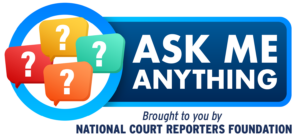By Kay Moody

Setting realistic, tangible goals is an essential element of completing court reporting school and developing the speed and accuracy needed to work as a reporter. When you take timed writings and read your notes, identify your weaknesses. Once you know the major reason you’re not progressing, set a goal to eliminate the problem(s) and work on them every day for five, ten, or fifteen minutes. Work on the same goal until it’s no longer a weakness. Work on drills and dictation takes until the weakness no longer exists. This article lists the five major reasons students do not progress and ways to eliminate or correct these hindrances: lagging behind and dropping words; messy notes; hesitating or missing briefs, phrases, and/or conflicts; difficult outlines or unfamiliar vocabulary; and not finding enough time to practice.
Goal of eliminating drops
When you work on speedbuilding, don’t make corrections with the asterisk (*). Leave the misstroke in your notes. Write the entire take, read back your notes, and count how many words you dropped, not the misstrokes. Take the same selection two or three times a day and focus on one thing: staying with the dictation and writing every word. Read back each take, and count the drops to make sure that you have fewer and fewer drops on each take. Continue taking the selection two or three times every day until you write the entire selection with no drops. Once you accomplish this, go on to another selection at the same speed. After you can write your goal speed repeatedly with no drops, go to a higher speed.
Please note that working on speed is different from working on accuracy for realtime, perfect translation. That is why you are discouraged from making corrections while working on speed.
Goal of writing clean notes
Drop down to a lower speed and write with the goal that 99 percent of your outlines will be perfect. Write slower dictation from something you recorded, and count all your misstrokes. Drill on writing the correct outlines for all misstroked words, repeat the selection, and use the same technique described for eliminating drops.
An excellent way to clean notes is to work from straight copy. Write an article from your textbook or the newspaper and write it at your natural speed without a single misstroke.
Goal of learning briefs, phrases, and conflicts
Instead of saying, “I’m going to learn all of the briefs in my brief book,” set an attainable, measurable goal. “I’m going to review briefs every day, and I’m going to go over one column (or 25 outlines) every day for ten or fifteen minutes until I can automatically write every outline.” This is an easily attainable goal. When you’ve mastered that group with perfect outlines, tackle a new list or column.
Goal of being able to write difficult words and outlines
Similar to learning briefs, phrases, and conflicts, every time you hear a difficult outline or a word you’ve forgotten how to write, jot it on a sticky note, and write that word with its shorthand outline in your notebook. Practice a column from this list for five, ten, or fifteen minutes every day. This is an ongoing goal and something you’re encouraged to do throughout your court reporting skill development.
Goal of practicing more
Prepare a time management schedule, and make sure you have allowed sufficient time for practice. Establish time to work on word lists, steno outlines, drills, and other skill- and speedbuilding activities. Make a checklist, and check off all the activities that you accomplish each day. You must be disciplined! Identify your short-term, daily goals and work on them at specific times every day, at least six days a week.
To summarize the elements of goal setting:
- Set a goal every time you sit at your machine, whether it is in class or a short practice session.
- Develop goals that eliminate weaknesses, that develop strengths, and that are small.
- Create goals that are positive, measurable, and specific.
- Reward yourself when you succeed in reaching a goal.
Kay Moody, MCRI, CPE, is an instructor for the College of Court Reporting based in Valparaiso, Ind.























